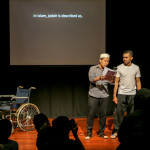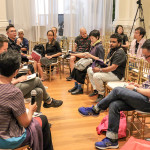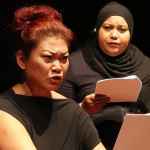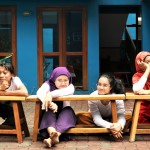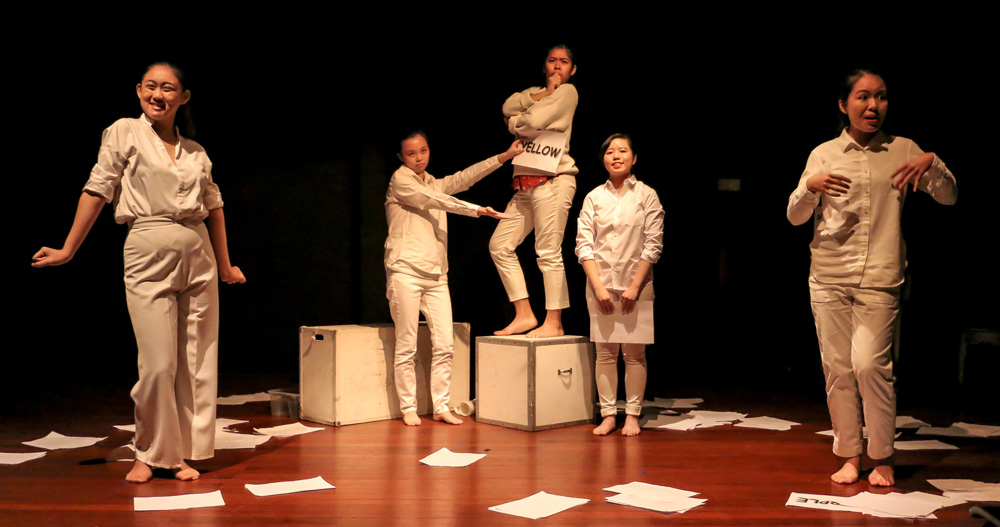
The opening scene from Gossip GRLs which was presented as part of The Vault: Gossip, Symphony and Other Matters.
Centre 42 is a blue-hued greenhouse for plays. Some theatre-makers arrive with a sapling of a play, and we simply provide time and space for growth. And sometimes, we give a bit more of a nudge. For the first time at Late-Night Texting, our annual showcase of fresh new writing and emerging artists, we’re showcasing some of the plays that we’ve helped nurture from seeds of ideas, like the Boiler Room plays which require more care and guidance to germinate, and the Vault presentations which were given a structure to latch on to and climb.
Giving room to breathe

Boiler Room playwrights Zee Wong (left) and Tan Liting (right) will be showcasing their plays at Late-Night Texting.
At Late-Night Texting 2019, Room to Breathe will feature dramatised readings of two plays, The Women Before Me by Zee Wong, and Pretty Butch x 不男不女 by Tan Liting. Both plays were developed in Boiler Room, our research-based playwriting programme which guides budding playwrights to grow an idea into a full-length script for the stage.
The Women Before Me is one of the newest works to emerge from the Boiler Room nursery. Playwright Zee recently concluded her Boiler Room tenure with a private test-read of her play in March 2019. A searing drama that intertwines a fictional tale of sexual assault with European art history, the play took Zee over two years to write it.
“I first thought about writing about [sexual assault] four years ago. I actually wrote a monologue and a bunch of loose scenes. I submitted them [for the 2016 Boiler Room open call],” Zee recalls in an interview with Centre 42. “[The submitted version] drew a lot from my own personal experiences and was intensely personal. It was too exposing, too vulnerable.
“So when Robin and Casey very kindly agreed to take on my idea as a Boiler Room project, our work together very much centred on trying to find out some emotional distance between me and the piece that I was going to write, without diluting the message.” Robin Loon and Casey Lim are the stewards of the Boiler Room programme, who look after dramaturgy and script direction respectively.
“Robin and Casey were very instrumental in guiding me in the research phase, because I knew what I wanted to explore but it was very overwhelming because I didn’t know where to start,” Zee says. As part of her research, she looked at sexual assault legislation and real-life cases of sexual assault. Zee later stumbled upon the story of 17th-century Italian painter and rape survivor Artemisia Gentileschi, and, according to her, “a light bulb went off”.
Our second featured Boiler Room playwright, Liting, also drew from real life for her play Pretty Butch. As its title suggests, the play explores the friction in the lives of five characters when gender norms and identities clash. For her research, Liting interviewed people who identified with the label ‘butch’.
“I like the concept of telling real stories based on real people. So I sent out an open call to interview people who identify with the term [butch]. I managed to get about five or six people to talk to me,” Liting told Centre 42 towards the end of her Boiler Room journey.
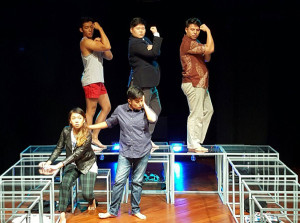
Pretty Butch premiered at the 2017 M1 Singapore Fringe Festival with a five-day run in our Black Box.
But Pretty Butch isn’t just based on other people; Liting also looked to herself when she wrote the play: “I identify as butch, which is a term that took very long for me to come to terms with. Because there is a stigma, whether it’s in society in general, or specifically in the queer community… Boiler Room was the safe space to look at myself and how I identify and how I’m positioned to this work. I didn’t actually interview myself, but I started writing these short segments from what I remember from my childhood, what I remember from my interactions with people, and then matching them with the experiences of [the interviewees].”
Liting joined Boiler Room in 2015. To date, Pretty Butch is one of the most mature offerings from the programme having been staged at the M1 Singapore Fringe Festival in 2017 to full houses and critical acclaim. However, what you will see at Late-Night Texting 2019 is really an off-shoot of the original play, a Mandarin translation which was read at the Taipei Arts Festival in 2018.
The Mandarin script is part of Liting’s plans to widen the reach of her play; she believes that a play about gender identity and sexuality is both timely and relevant across multiple cultural contexts. Taiwan, for instance, became the first Asian country to legalise same-sex marriage just a year after the Taipei Arts Festival reading.
Liting says, “I think we’re coming into a society or generation that’s starting to look at self-actualisation and autonomy. We’re starting to believe people can live their own lives […] I really think that eventually we’re going to get a point where equality for all sexes and sexualities can have a place in society. That’s my hope.”
Zee was drafting The Women Before Me when the #MeToo movement exploded in the US in 2017. “As #MeToo happened, it was really interesting and galvanising for me to keep going […] I know how common sexual assault and sexual harassment is. So many women in my life, even men, have experiences with it. So why aren’t we talking about it?”
But as much as the social conditions were ripe for plays of this nature, the writing was still an uphill battle for these two first-time playwrights, even with the support of Boiler Room. Liting, who previously only stage-manages and directs, reflects on the lonely process of writing: “I spend some days, consecutively, alone, and without talking to any human being. It’s tough being a writer… But I’m hanging in there.”
Zee is a freelance actor, so her first attempt at writing a full-length script was a “long-drawn, painful process” which brought up a lot of insecurities.
“I feel now I can say I am a playwright. It was just one play, but I’ll take it!”Zee Wong
“It’s just the self-doubt,” she shares. “You’re just not sure if it was any good, and struggling with your own insecurities about the work that you’ve created was probably the most challenging part… I lucked out in terms of having other artists who I could trust to share this draft with, to give me feedback.” Zee cites theatre-makers Tan Tarn How, Rei Poh and Chio Su Ping who advised her alongside Robin and Casey.
Ultimately, emerging from the other side of Boiler Room with a play in hand has to be immensely gratifying. Zee says, “There were many times I thought maybe I wouldn’t make it, but I did. So I’m very proud of that […] I feel now I can say I am a playwright. It was just one play, but I’ll take it!”
Liting concurs: “To be thrown into [the Boiler Room] process and to have to write my own play was very refreshing for me. You may not be the best playwright, but you can write a play. You can put words on a page, and you can create characters. And for me, that’s very empowering as an artist to know that I have the ability to do that.”
Zee’s The Women Before Me will be read on 30 August and Liting’s Pretty Butch, on 31 August in Room To Breathe at Late-Night Texting 2019.
Taking a Second Look
Also at Late-Night Texting this year, we’re bringing back three Vault presentations which respond to plays from different decades of Singapore theatre history. These three Vaults were developed by next-generation theatre-makers, all in their 20s, from the National University of Singapore’s Theatre Studies programme.
Our Vault series is rooted in the belief that there’s gold in the old, the old here referring to classic Singapore plays. It’s another way to grow new plays, by giving theatre-makers a brief to create, from these old plays, original works which speak to contemporary audiences.
Responding to Robert Yeo’s 1979 political drama One Year Back Home, The Vault: Gossip, Symphony and Other Matters featured three sketches from the 2019 Theatre Studies graduating cohort and was staged in April 2019. One sketch, titled Gossip GRLs, will be reprised in its entirety at Late-Night Texting.
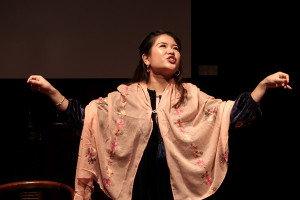
@thisiemeraldgirl is performed by NUS Theatre Studies graduate and YouTube content creator Brenda Tan.
Gossip GRLs is a farce that delves into the world of Singapore politics via the middleman – the grassroots organisations, specifically the support staff who assist the grassroots leaders or GRLs. Michelle Simon Hariff, who plays a newcomer to the grassroots scene, says, “We settled on the concept of GRLs because oftentimes I think we forget about the in-between bureaucracies, which is the staff [and] the GRLs – the people who are trying to connect the public to the government.”
Cherie Ho plays a veteran staff member who is “emotionally empty” after working in the grassroots organisation for six years. On creating the laughs-a-second script, she says, “We’re just five friends, basically. We joke around with each other, and we tend to laugh a lot. We just have a lot of fun with it. We want to make it meaningful, but we also wanted something for the audience to enjoy as much as we do.”
In 2018, The Vault: @thisisemeraldgirl took on the landmark monodrama, Emily of Emerald Hill. The play was written in 1982 by Stella Kon, and its titular character has been brought to life by the likes of veteran Singaporean thespians Margaret Chan, Karen Tan and Ivan Heng. @thisisemeraldgirl imagines what life would be like for the Emerald Hill matriarch’s great granddaughter Elisabeth Gan, who is a popular social media influencer living in Emily’s mansion in the present day.
“You can never tell who Emily [in the original play] was addressing – the audience in the 1950s, or in the future, or in the past,” @thisisemeraldgirl writer Eugene Koh says. “I drew the parallel to YouTube videos, where everything seems like it’s happening in the present, even though you know it’s made in the past. So it started from that idea.”
“There’re tables in the middle of the room and then we sit around the table. And instead of an improv session – there’s no acting – [we] just write.”Matthew Fam
Eugene shares that the voice of Elisabeth mostly came from Brenda Tan, who performs the character. Brenda herself is a social media personality with a sizable following. She reflects on the process of creating Elisabeth: “I also make YouTube videos, so in many of these instances I am being me and I can relate, but at the same time I have to be very careful and remember that it’s also not me.” Brenda will be performing an excerpt of @thisisemeralgirl for Double Takes at Late-Night Texting.
And last, but not least, The Vault: Project Understudy from 2016 birthed a sequel to the political satire, Undercover, written by Tan Tarn How in 1993. In Undercover, a spy for a national intelligence agency infiltrates a charitable organisation suspected of communist leanings. Understudy is set 22 years after the events of Undercover, with three characters from the original play returning as high-powered individuals, each with a young protégé in tow. The lives of both old and new characters intersect when a decision has to be made about the year’s Cultural Medallion recipient.
Understudy was collaboratively written by seven writers, with each writer taking on a character. Matthew Fam, who wrote lines for Jane, previously a spy in Undercover, describes a typical script-writing session: “There’re tables in the middle of the room and then we sit around the table. And instead of an improv session – there’s no acting – [we] just write.” The team of young writers will return to read character monologues from the three newly-created characters of Understudy at Late-Night Texting.
@thisisemeraldgirl, Gossip GRLs and Understudy will be performed in Double Takes at Late-Night Texting 2019 on 30 & 31 August.
More than One Way
Creating theatre is risky business, because it’s difficult to tell what sort of fruit all that work, time and effort would produce. But as the unfortunate-sounding saying goes, there’s more than one way to skin a cat. For Centre 42, we try different ways to help playwrights and theatre-makers create new work. And at this upcoming Late-Night Texting, we’re proud to show you the fruits of our artists’ labour.
By Daniel Teo
Published on 7 July 2019
You can catch all these exciting works (and more) at Late-Night Texting on 30 & 31 August 2019! Click here for the full programme line-up.

